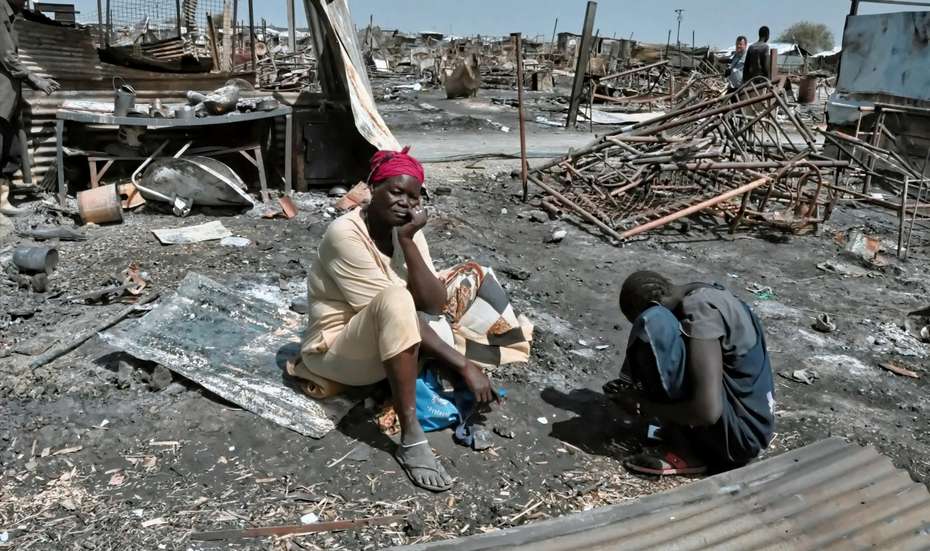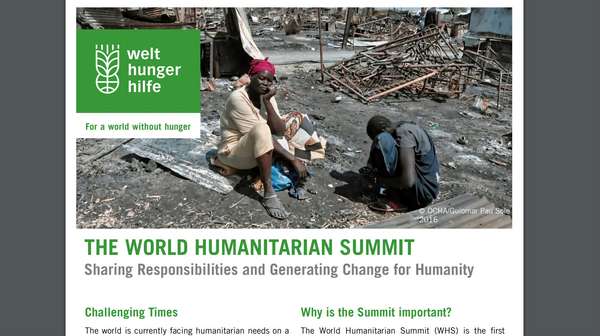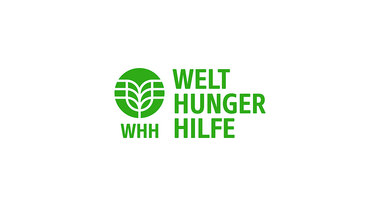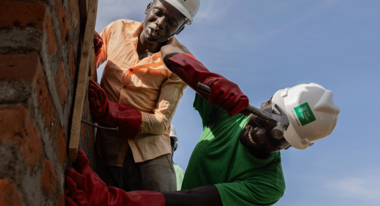The World Humanitarian Summit: Sharing Responsibilities and Generating Change for Humanity
World Humanitarian Summit 2016
Shift in paradigm from reaction to prevention: actors in politics, civil society and economy have to pave ways for innovations.

The World Humanitarian Summit (WHS) is the first ever global summit on humanitarian action. The WHS was held from 23. to 24. May, 2016 in Istanbul. It aimed to build a more diverse humanitarian community to set a new agenda for humanitarian action. "The Summit was a good start but nothing more", Dr. Till Wahnbaeck sums up.

The world is currently facing humanitarian needs on a scale that has not been witnessed since the Second World War. Political failures, instability, armed conflicts and a lack of respect to International Humanitarian Law (IHL), climate change, global inequalities, as well as the long-term mass displacement of people, are common features of today‘s world, driving the escalation of people in need. In 2015, 78 million people were in need of humanitarian aid and this figure is expected to rise over the next years. However, the current supply of humanitarian financing is not at all sufficient for meeting the rising scale of humanitarian needs.
The summit brief
-
World Humanitarian Summit (WHS)
-
location: 23. and 24. of May 2016, Istanbul
-
initiator: UN General Secretary Ban Ki-moon
-
Goals: reinvigorating a commitment to humanitarian principles, initiating concrete commitments for optimising disaster preparedness, sharing best practices
-
Approx. 5,000 participants: Heads of State and Government, humanitarian organisations, community leaders, affected people, youth and businesses
In 2014 alone, an average of 42,500 people were displaced each and every day! Humanitarian crises have devastating consequences on the health and mental wellbeing, food security, livelihoods, physical security, personal ambitions and dignity of affected people.
"80 per cent of the humanitarian aid is used in conflict areas. We need more diplomacy and political will to end conflicts and civil wars", says the Secretary General of Welthungerhilfe Dr. Till Wahnbaeck. "It is a shame that none of the leaders from the UN Security Council Members came to the summit because humanitarian aid cannot end conflicts."
Focus: Climate Risk Insurance
Dr Till Wahnbaeck, Welthungerhilfe's General Secretary, will be a panelist at a WHS side event on the InsuResilience climate insurance initiative:
Side event with BMZ and WFP: "Reducing the Humanitarian Finance Gap: The Power of Insurance, Forecast-Based Action and Recovery Finance".
Indeed a collective rethink is required to better meet the needs of millions of people affected by conflicts and disasters and those at risk. "The Summit was a good start but nothing more", Wahnbaeck sums up. Now a plan is needed that involves all relevant actors in politics, civil society and economy. The objectives:
-
Use the money in a more efficient way to change from reaction to preparedness.
-
Strengthen the resilience capacities of people so that they can deal with emergency situations in a better way.
-
Include people in the affected areas right from the start because they know best what is needed.
Why is the World Humanitarian Summit important?
The WHS represents a collective opportunity to build a more diverse humanitarian community which is able to set a new agenda for humanitarian action. The process leading up to the Summit has encompassed extensive consultations over the last three years, culminating in UN Secretary General Ban Ki-moon's "Agenda for Humanity" which calls for commitments to five Core Responsibilities considered to be absolutely critical for transforming the lives of people affected by humanitarian crises and ending humanitarian needs:
5 Core Responsibilities:
-
Political leadership to prevent and end conflicts
-
Uphold the norms that safeguard humanity
-
Leave no one behind
-
Change People‘s lives - from delivering aid to ending need
-
Invest in humanity
At the Summit, Heads of State and Government, humanitarian organisations, community leaders, affected people, youth and businesses will announce major commitments for achieving the Agenda for Humanity.
Agenda for Humanity
Our Commitments to the Agenda for Humanity and Beyond (shortened; for full version see PDF):
1. People are at the heart of our humanitarian action. We will listen to them, respect their specific needs, support them in their self-reliance, seek their feedback and be accountable to them.
2. We support the launch of the Global Alliance for Humanitarian Innovation, Global Risk Platform and the Connecting Businesses Initiative and commit to better harnessing competencies and knowledge from other sectors.
3. We will anticipate risk and take early action in humanitarian situations by increasing investments in early warning and preparedness measures.
4. Local actors and communities = critical "first responders", agents for realising the principle of "help towards self-help". We commit to making new investments in local capacities for enhanced resilience, preparedness and response.
5. Integration of local humanitarian actors into the international humanitarian system
´Why does Welthungerhilfe take part in the WHS?
WHH is actively participating in the Summit because we believe that it is necessary to work collectively and with a shared responsibility to overcome the multiplicity of challenges the world faces today. Humanitarian disasters, both natural or manmade, risk destabilising families, communities, countries and whole regions. In this complex world, no single individual, organisation or nation can manage the scale of humanitarian needs worldwide, alone.
As an organisation guided by the principle of "help towards self-help", working both in emergency relief and on long-term development, we are committed to providing sustainable solutions to food and nutrition security by supporting local capacities for self-reliance. Fighting malnutrition and ending hunger in rural areas through investments in sustainable farming and agriculture is our commitment to ensuring the long-lasting stability of individuals, families and societies. Food security is a prerequisite for all aspects of development. However, the persistance of humanitarian needs concern us greatly as these erode away at developmental gains and place reliance on humanitarian aid.
The previous separation of humanitarian assistance and longer-term development cooperation no longer meets the requirement. National and local systems and organisations must be strengthened and more intensively integrated into the coordination of international actors. Welthungerhilfe has committed to give even more support to local partners and provide them with training, in order that they themselves are in a position in the long-term to act quickly in disaster situations.
„Climate risk insurances are a good example because they are faster, cheaper and more efficient than the usual way of reacting after the disaster has happened. The Summit could have been a starting point for financing these new ideas and concepts but we missed that moment“, Wahnbaeck regrets.
Political Responsibilities – what we demand
We are ready to commit to the "Agenda for Humanity" in our capacity as an INGO but our bottom line is: we demand global political will and collective action to achieve lasting transformation for the millions of people in need and the many millions more who are vulnerable and at risk of conflicts, natural disasters, malnutrition and hunger. For this reason, Welthungerhilfe calls upon national governments and the UN to:
- Commit to strong political leadership and international diplomacy to end conflicts and hold IHL violators accountable: this is absolutely crucial for achieving "Zero Hunger" by 2030.
- Follow-up and respect the commitments and outcomes of the WHS by developing a global-level system to monitor progress on the Agenda for Humanity that is linked to the Agenda 2030‘s SDGs.
- Break the silos between humanitarian and development financing: make long-term funding more readily available to manage protracted humanitarian crises situations.
- National governments need to guarantee humanitarian access and uphold the minimum operational requirements for humanitarian assistance: movement of supplies, work permits and visas for aid workers, security of aid workers and medical facilities, and the protection of affected populations and their assets.
- Reinforce the unique role that INGOs play in working long-term with communities and local partners. Step-up investments that enable INGOs to better support local actors in their resiliencebuilding efforts while making new financing available to local actors and CSOs.
- Build on experiences of the G7 Initiative on Climate Risk Insurance (InsuResilience): explore new financing mechanisms, invest more in risk reduction and support the development of similar national mechanisms in disaster-prone countries







